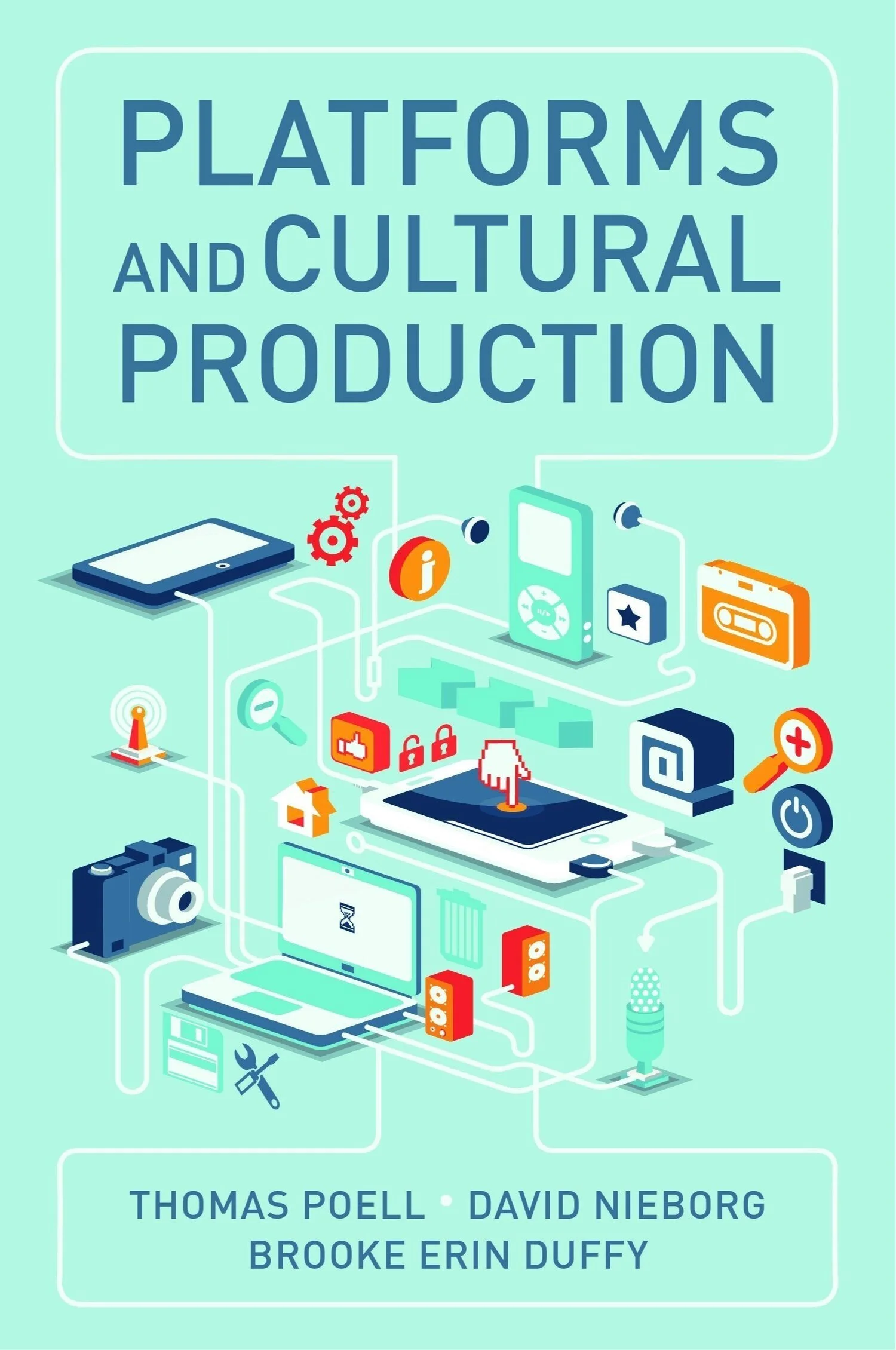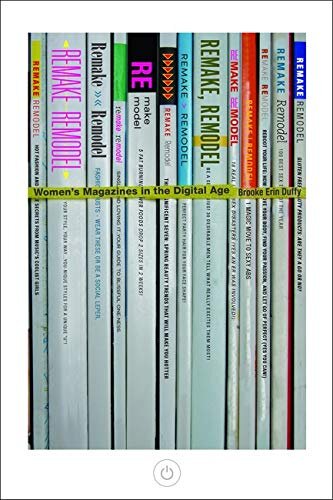PRAISE AND REVIEWS FOR (NOT) GETTING PAID TO DO WHAT YOU LOVE
“Duffy’s exploration of sexism, as well as her probe of the gig economy, makes this an interesting and informative read for anyone—even those who aren’t following Instagram’s foodies and fashionistas.”—Wired.com
“Duffy refutes the idea that anyone can make a living doing what they love online—whether they’re a food or fashion influencer or any other kind of gig worker. Women, especially, get exploited as the line blurs between hobby and career, she explains.”—Entrepreneur
“Duffy does a superb job. . . . This book will be a welcome addition on the bookshelves of scholars interested in the intersection of new media and labor, in personal branding, and in how young middle-class women imagine working for passion under precarious labor conditions.”–Ilana Gershon, ILR Review
“A timely contribution to the wider debates around digital content creation.”—Kait Kribs, Journal of Cultural Economy
“(Not) Getting Paid to Do What You Love is an engaging read, thanks in large part to Duffy’s effervescent prose and palpable empathy for her subjects. It is strongly recommended.”—Austin Morris, Media Industries
“Duffy is a talented interviewer and observer who offers a thorough, well-researched description of the world of social media aspirants, and sociologists will find much to like about this book.”—Christin L. Munsch, American Journal of Sociology
“Duffy’s book skilfully casts light on what drives people to push themselves so hard to make it in online worlds of ‘content creation’ – and she provides a convincing feminist analysis of how this ‘aspirational labor’ is deeply gendered.” — David Hesmondhalgh, co-author of Creative Labour: Media Work in Three Cultural Industries
"Duffy chronicles, with clarity and compassion, what she calls “aspirational labor”—an intoxicating desire to forego the realities of today’s soulless and uncertain labor market for the allure of a more soulful connection to meaningful work. Using today’s dizzying world of social media microcelebrity to make her case, Duffy accomplishes that rare thing: advances theory with elegance, challenging all easy reads of late capitalism, while helping readers see themselves in the book’s careful, detailed accounts of people’s lives."—Mary L. Gray, Indiana University and Microsoft Research
"A necessary antidote. Duffy deftly reveals the sweat of young women content creators, offering a new perspective on gender and the digital economy."—Leslie Regan Shade, University of Toronto
“A fascinating, meticulously researched study that shows how these creative women exemplify modern workers. Her lessons are essential for all those interested in fashion studies, gender studies, and the creative economy.”—Angela McRobbie, author of Be Creative: Making a Living in the New Culture Industries
“Duffy is an excellent guide to the contemporary anxieties of aspirational labor, showing both the very calculated nature of investments these women are trying to make in their futures, while pointing to the larger social forces that shape and constrict their possibilities.”—Gina Neff, author of Venture Labor
“Duffy’s seminal work unearths once and for all what it’s truly like to work in the influencer economy of blogging and social media.”—Julia DiNardo, FashionPulseDaily.com
“This rich, original, and insightful book introduces a new concept—aspirational labor—for thinking about contemporary creative work and shows how gender and social media are intimately entangled with it. Highly recommended!”—Rosalind Gill, author of Gender and the Media
“This immensely valuable book reveals the trapdoor for female workers who pursue their talents on social media. Duffy expertly dissects a system which attracts many, rewards a few, and exploits the rest.”— Andrew Ross, author of Nice Work If You Can Get It: Life and Labor in Precarious Times
“Contrary to optimists who hoped that the internet would bail women out of the family-career bind, Duffy finds that female ‘digital-media hopefuls’ rarely get paid for their work. The phenomenon Duffy describes is fascinating.”—Frances McCall Rosenbluth, coauthor of both Forged Through Fire and Women, Work, and Politics
"Smart and original. Drawing on fieldwork and interviews with fashion bloggers and vloggers, Duffy unpacks the pressures of self-branding, status-seeking, and audience-building inherent in the gendered struggle to get paid doing what you love."—Laura Grindstaff, author of The Money Shot
“Duffy's critically astute study reveals the intersection of pleasure and power in contemporary capitalism and clearly articulates an essential new perspective on digital labor.”— Kylie Jarrett, author of The Digital Housewife
“This insightful account will resonate with anyone who has ever sought to turn personal passions into wage-earning employment, juggled multiple part-time gigs, or struggled to fit pleasurable hobbies around a ‘real’ job or jobs.”—Library Journal, starred review
“[A] thoroughly researched and considered work.”—Choice
"This book is particularly helpful for those studying social media, gender, and the digital economy, and opens up many questions about media industries, aspirational labor, and the merging of creative expression and entrepreneurial ideologies."—Zoetanya Sujon, International Journal of Communication
OVERVIEW AND PRAISE FOR PLATFORMS AND CULTURAL PRODUCTION
The widespread uptake of digital platforms – from YouTube and Instagram to Twitch and TikTok – is reconfiguring cultural production in profound, complex, and highly uneven ways. Longstanding media industries are experiencing tremendous upheaval, while new industrial formations – live-streaming, social media influencing, and podcasting, among others – are evolving at breakneck speed.
Poell, Nieborg, and Duffy explore both the processes and the implications of platformization across the cultural industries, identifying key changes in markets, infrastructures, and governance at play in this ongoing transformation, as well as pivotal shifts in the practices of labor, creativity, and democracy. The authors foreground three particular industries – news, gaming, and social media creation – and also draw upon examples from music, advertising, and more. Diverse in its geographic scope, Platforms and Cultural Production builds on the latest research and accounts from across North America, Western Europe, Southeast Asia, and China to reveal crucial differences and surprising parallels in the trajectories of platformization across the globe.
Offering a novel conceptual framework grounded in illuminating case studies, this book is essential for students, scholars, policymakers, and practitioners seeking to understand how the institutions and practices of cultural production are transforming – and what the stakes are for understanding platform power.
“The most impressive and illuminating research yet published on how digital platforms are reshaping the cultural industries.”
David Hesmondhalgh, University of Leeds
“The authors expertly explore the ways that platforms have produced opportunities and constraints for media creators. Their account is clear and engaging and will doubtlessly provide a foundation for many conversations about the role of platforms and culture in the coming decade.”
Amanda Lotz, Queensland University of Technology
“[It] will be [a] valuable reference [book] for students in the field of media and cultural studies. [It] may also inspire researchers and practitioners in related fields to understand how culture is created and modulated on platforms, and how culture can be studied in the platform environment.”
Media, Culture & Society
OVERVIEW AND PRAISE FOR REMAKE, REMODEL: WOMEN’S MAGAZINES IN THE DIGITAL AGE
What is a magazine? For decades, women's magazines were regularly published, print-bound guidebooks aimed at neatly defined segments of the female audience. Crisp pages, a well-composed visual aesthetic, an intimate tone, and a distinctive editorial voice were among the hallmarks of women's glossies up through the start of the twenty-first century. Yet in an era of convergent media technologies, participatory culture, and new economic demands, producers are confronting vexing questions about the identity of women's magazines.
Remake, Remodel: Women's Magazines in the Digital Age offers a unique glimpse inside the industry and reveals how executives and content creators are working tirelessly to remake their processes and products. Through in-depth interviews with women's magazine producers, an examination of hundreds of trade press reports, and in-person observations at industry summits, Brooke Erin Duffy chronicles a fascinating transformation in print culture and technology from the magazine as object to the magazine as brand. She draws on these findings to contribute to critical debates about media professionals' labor conditions, workplace cultures and hierarchies, and creative processes.
"A remarkable case study of an industry in flux, Duffy's well-researched book would be an asset to any course on magazine media in general and on women's magazines in particular."--Journalism & Mass Communication Quarterly
"Remake, Remodel offers a compelling look at the ways in which a shifting media landscape is provoking structural changes in labor organization, content development, and professional identity within the women's magazine industry."--Journal of American Culture
"Remake, Remodel is not intended as a harsh attack on new media's participatory culture, but it aims (and succeeds) in presenting "a more nuanced view" of the magazine industry. . . . An excellent resource for both scholars and teachers."--Journal of Magazine & New Media Research
"A cutting-edge study at the forefront of new conceptualizations and practices in the magazine industry. Duffy insightfully charts the dilemmas and complexities the magazine faces as it strives to define itself in the face of changes in technology and political economy in media and advertising."--Matthew P. McAllister, coeditor of The Routledge Companion to Advertising and Promotional Culture
"Brooke Erin Duffy offers a timely, well-researched account of recent shifts in the women's magazine industry and the impact of these changes on publishers and consumers. Her book offers an engaging analysis of the ways in which magazine producers have been compelled to engage with new media platforms in the quest to maintain profitability."--Anna Gough-Yates, author of Understanding Women's Magazines: Publishing, Markets, and Readerships in Late-Twentieth Century Britain


